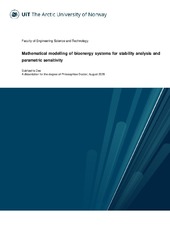Blar i forfatter "Das, Subhashis"
-
Effect of pH, COD, and HRT on the Performance of Microbial Fuel Cell Using Synthetic Dairy Wastewater
Banerjee, Aritro; Calay, Rajnish K; Das, Subhashis (Journal article; Tidsskriftartikkel; Peer reviewed, 2023-09-30)Microbial fuel cells (MFC) are emerging technologies that can produce electricity while treating wastewater. A series of tests were carried out to evaluate the efficiency of this technology for treating dairy wastewater (DWW). The experiments used Shewanella baltica as an exoelectrogen in a small single MFC to treat simulated DWW. The impacts of various operational factors, specifically pH, ... -
Enhanced performance of microbial fuel cells using electrochemically treated carbon felt anode
Poureshghi, Fatemeh; Calay, Rajnish K; Das, Subhashis (Journal article; Tidsskriftartikkel; Peer reviewed, 2023-11-10)The microbial fuel cell (MFC) technology is emerging as an effective technology for wastewater treatment to remove and detect many pollutants and simultaneously generate power. The anode is an essential component for bacterial attachment and extracellular electron transfer (EET). Thus, anode performance is critical for improving an MFC system's overall performance. Materials that are electronically ... -
Experimental Study of Power Generation and COD Removal Efficiency by Air Cathode Microbial Fuel Cell Using Shewanella baltica 20
Das, Subhashis; Calay, Rajnish K (Journal article; Tidsskriftartikkel; Peer reviewed, 2022-06-05)Microbial fuel cells (MFCs) are a kind of bioreactor for generating electricity, facilitated by exoelectrogens while treating wastewater. The present article focuses on the performance of an air cathode plexiglass MFC in terms of chemical oxygen demand (COD) removal efficiency and power output by performing two sets of experiments. The proton exchange membrane and electrode materials were Nafion ... -
Investigating Effects of pH on Microbial Growth in Continuous Stirred Tank Bioreactors
Das, Subhashis; Calay, Rajnish K; Chowdhury, Ranjana (Conference object; Konferansebidrag, 2017) -
Mathematical modelling of bioenergy systems for stability analysis and parametric sensitivity
Das, Subhashis (Doctoral thesis; Doktorgradsavhandling, 2021-03-19)<p>This thesis presents a research study on bioreactor design and biochemical processes for conversion of biomass into bioenergy and develops mathematical models that can be used for designing better reactors and control systems. Good design of the bioreactors and understanding of the biochemical process is essential to control the process for maximizing the yield. Improving the performance efficiency ... -
Parametric Sensitivity of CSTBRs for Lactobacillus casei: Normalized Sensitivity Analysis
Das, Subhashis; Calay, Rajnish K; Chowdhury, Ranjana (Journal article; Tidsskriftartikkel; Peer reviewed, 2020-06-18)In this paper, a sensitivity analysis of a continuous stirred tank bioreactor (CSTBR) was conducted to determine a parametrically sensitive regime. The growth of a lactic acid bacterium, namely, <i>Lactobacillus casei</i>, in a pH-controlled CSTBR was considered as a process model. Normalized objective sensitivities of the minimum pH were determined with respect to input parameters. A generalized ... -
Product Inhibition of Biological Hydrogen Production in Batch Reactors
Das, Subhashis; Calay, Rajnish K; Chowdhury, Ranjana; Nath, kaustav; Eregno, Fasil (Journal article; Tidsskriftartikkel; Peer reviewed, 2020-03-12)In this paper, the inhibitory effects of added hydrogen in reactor headspace on fermentative hydrogen production from acidogenesis of glucose by a bacterium, Clostridium acetobutylicum, was investigated experimentally in a batch reactor. It was observed that hydrogen itself became an acute inhibitor of hydrogen production if it accumulated excessively in the reactor headspace. A mathematical model ... -
Ship resistance analysis using CFD simulations in Flow-3D
Deshpande, Sujay; Sundsbø, Per-Arne; Das, Subhashis (Journal article; Tidsskriftartikkel; Peer reviewed, 2020-09-19)While designing the power requirements of a ship, the most important factor to be considered is the ship resistance, or the sea drag forces acting on the ship. It is important to have an estimate of the ship resistance while designing the propulsion system since the power required to overcome the sea drag forces contribute to ‘losses’ in the propulsion system. There are three main methods to calculate ...


 English
English norsk
norsk






